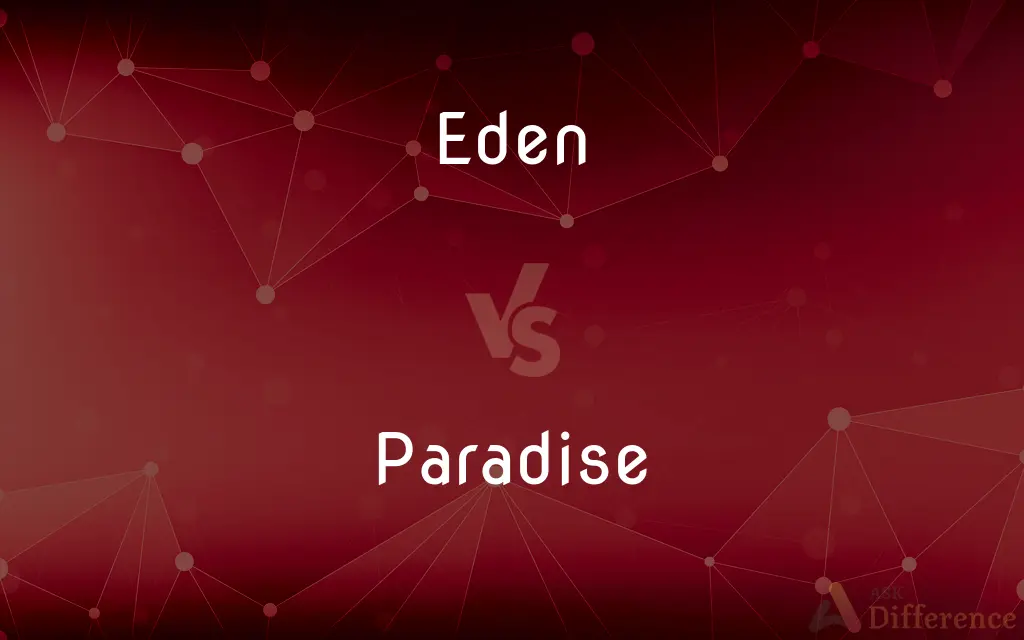Eden vs. Paradise — What's the Difference?
Edited by Tayyaba Rehman — By Fiza Rafique — Updated on March 28, 2024
Eden refers specifically to the biblical Garden of Eden, the original home of Adam and Eve, while paradise is a general term for an ideal place or state of bliss, happiness, and harmony.

Difference Between Eden and Paradise
Table of Contents
ADVERTISEMENT
Key Differences
The term Eden is most commonly associated with the biblical Garden of Eden, described in the Book of Genesis as the utopian garden where the first humans, Adam and Eve, lived before their expulsion due to disobedience. On the other hand, paradise is a broader concept that transcends specific religious or historical contexts, representing an ideal place or state of existence characterized by bliss, peace, and fulfillment. Paradise can be a spiritual realm, a physical place, or a metaphorical state of being, often used in religious, philosophical, and literary texts to describe ultimate happiness or an afterlife of perfect contentment.
While Eden is tied to the Abrahamic religions' narrative of creation and fall, symbolizing both the perfection of the world as God created it and the human fall from grace, paradise is a universal concept found in many cultures and religions, signifying an ultimate goal or a place of eternal happiness. Eden's story conveys lessons about obedience, temptation, and the consequences of human actions, focusing on the relationship between divine commands and human free will. Conversely, paradise often represents the reward for moral virtue, spiritual growth, or faithfulness, encompassing a wide range of interpretations from the heavenly abodes of the afterlife to earthly places of natural beauty or peace.
Both Eden and paradise carry connotations of purity, beauty, and a deep connection with the divine or the spiritual; however, Eden's significance is rooted in its specific narrative role within the context of biblical stories, serving as a foundational myth that explains the origin of human challenges and the loss of direct communion with God. In contrast, the concept of paradise is adaptable and multifaceted, used across cultures to express humanity's deepest yearnings for redemption, peace, and ultimate happiness.
The distinction between Eden and paradise highlights the contrast between a historical and religiously specific place with profound theological implications and a more universal and abstract concept that captures the human longing for a state of perfection, whether in this life or the next. Both terms, though different in scope and origin, reflect the enduring human desire to return to a state of innocence and joy, free from suffering and conflict.
Comparison Chart
Definition
The biblical garden where Adam and Eve lived before their fall.
A general term for an ideal place or state of bliss and harmony.
ADVERTISEMENT
Origin
Specifically mentioned in the Book of Genesis in the Bible.
Found across various cultures and religious traditions.
Symbolism
Innocence, unspoiled beauty, and the human fall from grace.
Ultimate happiness, peace, and spiritual fulfillment.
Context
A specific location within a religious narrative.
Can be spiritual, physical, or metaphorical.
Connection to Divinity
Direct communion with God in a specific narrative.
Broadly represents divine or spiritual harmony and contentment.
Lessons
Obedience, temptation, and consequences of actions.
Often associated with moral virtue, spiritual growth, or faithfulness.
Universality
Tied to Abrahamic religions.
Universal concept with varied interpretations.
Representation
A lost utopian state and a lost direct relationship with the divine.
Often depicted as a reward or an attainable state of being.
Compare with Definitions
Eden
Symbolic of innocence and purity.
The concept of Eden reflects humanity's longing for a return to innocence.
Paradise
An ideal place or state of bliss and fulfillment.
Many religions describe paradise as a reward in the afterlife.
Eden
The Garden of Eden: A biblical paradise lost due to original sin.
Eden is often depicted as a lush garden where Adam and Eve lived in perfect harmony with nature.
Paradise
Represents a universal longing for peace and happiness.
The concept of paradise is used to symbolize humanity's highest aspirations.
Eden
Represents the beginning of human history and challenges.
Stories of Eden explore themes of temptation, choice, and consequence.
Paradise
Can be spiritual or earthly, depending on context.
Literature often depicts paradise as an untouched natural landscape.
Eden
A specific place within the context of biblical narratives.
Eden is described in detail in the Book of Genesis.
Paradise
Associated with the reward for virtuous living or faith.
In many beliefs, paradise is attained through moral living and spiritual devotion.
Eden
Tied to the fall of man and the loss of direct communion with God.
The expulsion from Eden marks the beginning of human mortality and suffering.
Paradise
A metaphor for ultimate contentment and joy.
The poet used paradise to describe the profound peace found in love.
Eden
(Bible) The garden of God and the first home of Adam and Eve. Also called Garden of Eden.
Paradise
In religion, paradise is a place of exceptional happiness and delight. Paradisiacal notions are often laden with pastoral imagery, and may be cosmogonical or eschatological or both, often compared to the miseries of human civilization: in paradise there is only peace, prosperity, and happiness.
Eden
A delightful place; a paradise.
Paradise
(in some religions) heaven as the ultimate abode of the just
Martyrs who die in battle with the ungodly earn instant transmission to paradise
Eden
A state of innocence, bliss, or ultimate happiness.
Paradise
Often Paradise The Garden of Eden.
Eden
(rare) a paradise
Paradise
In various religious traditions, the Edenic or heavenly abode of righteous souls after death.
Eden
The garden where Adam and Eve first dwelt; hence, a delightful region or residence.
Paradise
According to some forms of Christian belief, an intermediate resting place for righteous souls awaiting the Resurrection.
Eden
Any place of complete bliss and delight and peace
Paradise
A place of great beauty or happiness
Saw the park as a paradise within a noisy city.
Eden
A beautiful garden where Adam and Eve were placed at the Creation; when they disobeyed and ate the forbidden fruit from the tree of knowledge of good and evil they were driven from their paradise (the fall of man)
Paradise
A state of delight or happiness
The newlyweds have been in paradise for months.
Paradise
The place where sanctified souls are believed to live after death.
Living in paradise comes with a price.
Paradise
A garden where Adam and Eve first lived after being created.
Paradise
(figuratively) A very pleasant place, such as a place full of lush vegetation.
An island paradise in the Caribbean
Paradise
(figuratively) An ideal place for a specified type of person, activity, etc.
A shoppers’ paradise
Paradise
(figuratively) A very pleasant experience.
Paradise
An open space within a monastery or adjoining a church, such as the space within a cloister, the open court before a basilica, etc.
Paradise
(obsolete) A churchyard or cemetery.
Paradise
(slang) The upper gallery in a theatre.
Paradise
To place (as) in paradise.
Paradise
(obsolete) To transform into a paradise.
Paradise
To affect or exalt with visions of happiness.
Paradise
The garden of Eden, in which Adam and Eve were placed after their creation.
Paradise
The abode of sanctified souls after death.
To-day shalt thou be with me in paradise.
It sounds to him like her mother's voice,Singing in Paradise.
Paradise
A place of bliss; a region of supreme felicity or delight; hence, a state of happiness.
The earthShall be all paradise.
Wrapt in the very paradise of some creative vision.
Paradise
An open space within a monastery or adjoining a church, as the space within a cloister, the open court before a basilica, etc.
Paradise
A churchyard or cemetery.
Paradise
To affect or exalt with visions of felicity; to entrance; to bewitch.
Paradise
Any place of complete bliss and delight and peace
Paradise
(Christianity) the abode of righteous souls after death
Common Curiosities
Is the concept of paradise unique to specific religions?
While the term paradise appears in various religious texts, the concept of an ideal place of happiness or afterlife reward is universal across many cultures and religions, albeit with different interpretations and conditions.
What is the Garden of Eden?
The Garden of Eden is a biblical location described in Genesis as the original home of Adam and Eve, characterized by perfect harmony and innocence before their expulsion due to disobedience.
How does paradise differ from heaven?
Paradise is often used interchangeably with heaven, but it can also refer to an earthly state of bliss and peace, not just the afterlife. Heaven is more specifically a spiritual realm where souls are believed to reside after death.
What does the expulsion from Eden symbolize?
The expulsion from Eden symbolizes the loss of innocence and the beginning of human suffering and mortality, reflecting on the consequences of disobedience and the complex nature of free will.
How do environmental ethics intersect with the concept of paradise?
Environmental ethics and the concept of paradise intersect in the valuation of harmony with nature, preservation of natural beauty, and sustainable living as essential for maintaining or achieving an ideal state of existence on Earth, echoing Edenic themes of stewardship and balance.
How is the concept of paradise used in literature?
In literature, paradise is often used metaphorically to represent an idealized state of happiness or escape from reality, reflecting deep human desires for peace, love, and fulfillment.
Can Eden be considered a type of paradise?
Yes, Eden can be considered a type of paradise due to its depiction as a perfect and harmonious garden; however, it is specifically the paradise lost due to the fall of man, with unique theological significance in biblical narratives.
Can the concept of paradise change over time or between cultures?
Yes, the concept of paradise reflects cultural values, religious beliefs, and historical contexts, leading to diverse interpretations and emphases on spiritual, physical, or psychological aspects of bliss and fulfillment, which can evolve over time.
What role does the quest for paradise play in human motivation and behavior?
The quest for paradise, whether understood as spiritual salvation, personal fulfillment, or societal utopia, plays a profound role in motivating human behavior, inspiring pursuits of virtue, exploration, creativity, and the transformation of social structures towards more harmonious and fulfilling ways of life.
What lessons are drawn from the story of Eden?
The story of Eden teaches about temptation, the importance of obedience to divine commands, and the profound consequences of human choices, highlighting themes of innocence, loss, and the hope for redemption.
Is there a way to regain or access Eden in religious or spiritual practices?
In religious narratives, access to the original Eden is lost to humanity, but many religions offer paths to a new paradise or state of communion with the divine through faith, repentance, and living according to divine laws, symbolizing hope for restoration and eternal happiness.
How do depictions of paradise in art and media influence our understanding of it?
Depictions of paradise in art and media shape and reflect societal understandings of ideal beauty, harmony, and happiness, often blending spiritual, natural, and fantastical elements to evoke a sense of peace and longing, influencing personal and collective imaginations of what constitutes a perfect existence.
How do modern interpretations of Eden and paradise vary?
Modern interpretations may emphasize psychological, symbolic, or ethical aspects of these concepts, reflecting contemporary values and concerns while exploring timeless themes of longing, loss, and the search for meaning.
Why is the Garden of Eden significant in religious teachings?
The Garden of Eden holds significant theological importance as it represents the ideal state of existence humans once had, direct communion with God, and the introduction of sin into the world, serving as a foundation for understanding human nature, free will, and the need for redemption in Abrahamic religions.
Are there any real places on Earth believed to be Eden or paradise?
While no specific location can be definitively proven as the biblical Eden, various cultures identify certain breathtaking or peaceful places as earthly paradises, reflecting the human desire to connect with nature, beauty, and tranquility as manifestations of the divine or sublime.
Share Your Discovery

Previous Comparison
Destroy vs. Destruction
Next Comparison
Diaeresis vs. UmlautAuthor Spotlight
Written by
Fiza RafiqueFiza Rafique is a skilled content writer at AskDifference.com, where she meticulously refines and enhances written pieces. Drawing from her vast editorial expertise, Fiza ensures clarity, accuracy, and precision in every article. Passionate about language, she continually seeks to elevate the quality of content for readers worldwide.
Edited by
Tayyaba RehmanTayyaba Rehman is a distinguished writer, currently serving as a primary contributor to askdifference.com. As a researcher in semantics and etymology, Tayyaba's passion for the complexity of languages and their distinctions has found a perfect home on the platform. Tayyaba delves into the intricacies of language, distinguishing between commonly confused words and phrases, thereby providing clarity for readers worldwide.














































